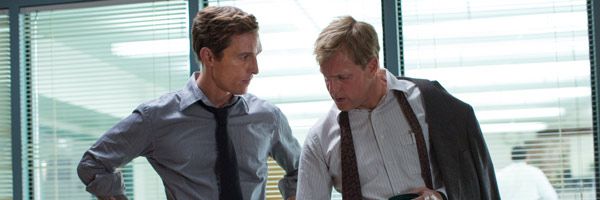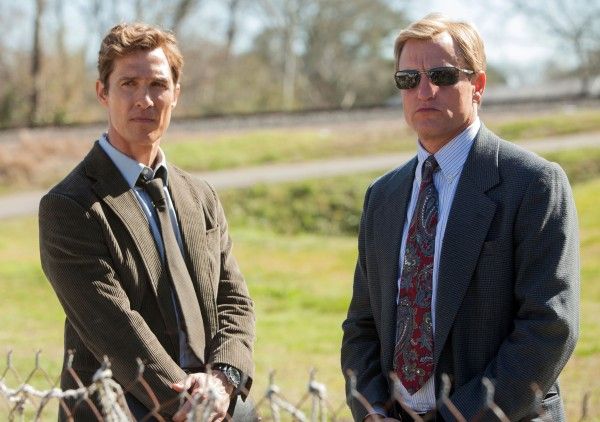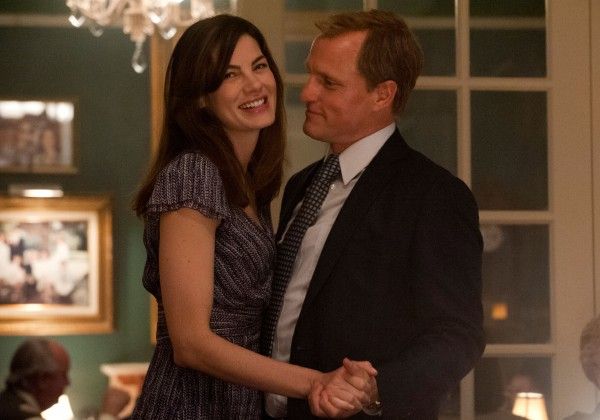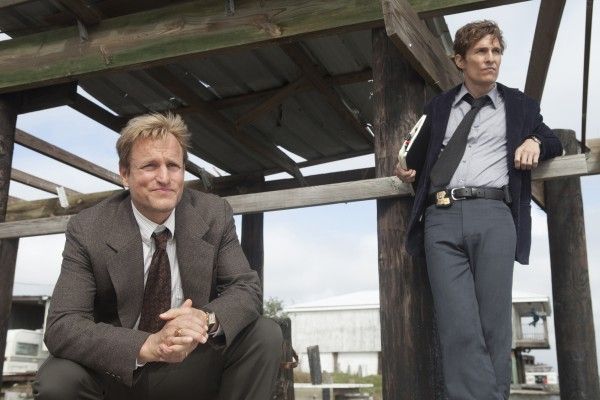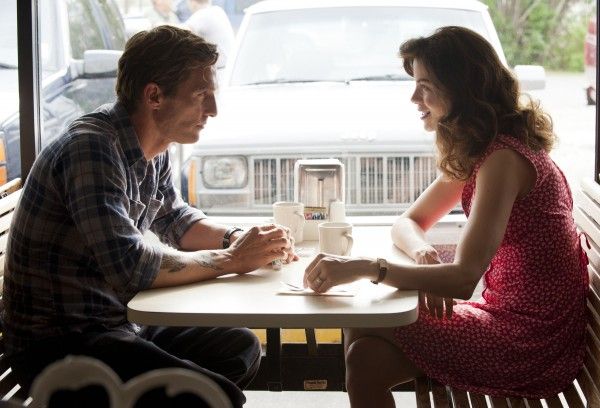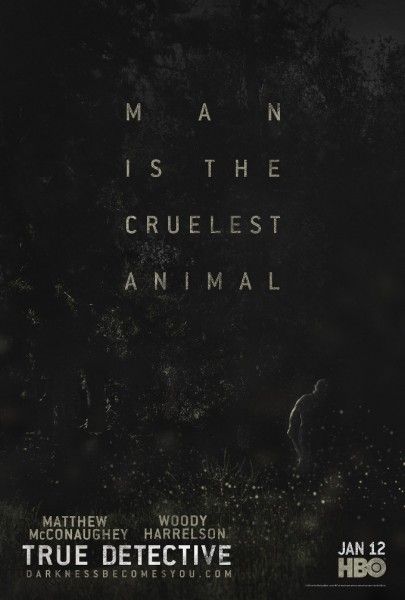HBO’s new eight-episode drama series True Detective tells the story of detectives Martin Hart (Woody Harrelson) and Rust Cohle (Matthew McConaughey), whose lives entwine during a 17-year hunt for a killer that started with the original investigation of a bizarre murder in 1995 and continues into the re-opening of the case in 2012. The show is as intriguing as it is unsettling, expertly acted and compellingly brought to life. It’s dark, brutal and volatile, but will keep you coming back for more.
During this recent exclusive phone interview with Collider, Cary Fukunaga (Jane Eyre, Sin Nombre), who directed all eight episodes of the series, talked about how this show came about, what led to the casting of Matthew McConaughey and Woody Harrelson, why he wanted to take on all eight episodes, how he approached it as an eight-hour film broken into chapters, the challenges of creating suspense, why he wanted to shoot on 35mm film, and how important all the little details are to him. He also talked about his next film Beasts of No Nation, with Idris Elba, and what compelled him to tell that story, that he’s currently rewriting the first part of the two-part It movie (based on the Stephen King novel) that he plans to make and his desire to modernize the horror in that story, and how involved he’ll be, if True Detective continues for future seasons. Check out what he had to say after the jump.
Collider: How did you come to be a part of this show?
CARY FUKUNAGA: It was a project developed at Anonymous Content, which is Nic [Pizzolatto] and I’s management company. The producer there, Richard Brown, brought it to me to direct it and develop it with Nic. The idea was to package it like you would package a movie, where you get the script, you have the director and you have the actors, and you go out and sell it and get an order. That was the strategy. So, once I became involved, we worked on the story and getting the first talent, which was Matthew [McConaughey] and Woody [Harrelson]. Once we had that, we went around town, and HBO is the one who bought it.
Was it you that thought of Matthew McConaughey and Woody Harrelson?
FUKUNAGA: The theoretical casting part of movies is the funnest part. You really can imagine so many different versions of a story, based on who’s embodying it. So, a lot of names were thrown out before Matthew was suggested. He wasn’t at the bottom of the list, but we were just spit-balling names. When Matthew came up, we were like, “Obviously, he’d be a great [Martin] Hart,” so we submitted him the Hart script. And then, he read the Hart script and was like, “No, I’d rather be [Rust] Cohle.” Once we wrapped our heads around that, I was like, “Okay, why the hell not?” This was before Killer Joe, or any of those movies came out. I had seen Lincoln Lawyer and, of course, I’d seen A Time To Kill, but he was more well known for being a romantic comedy actor. I actually enjoy the unexpected casting of people like that, especially if you know they have the range. So, once he said he wanted to do Cohle, I thought that was a pretty cool idea. He’s the one that actually suggested Woody, so I had a meeting with Woody in New York, which is where I live. We sat down for tea. He had just come off of a movie and wanted to go back to Maui, and I had to convince him that it would be a fun project. He was like, “It’s just a really dense script, man. There’s no comedy in it. It needs to be funnier.” I was like, “You’re right. It probably does, actually.” So, we promised him we would give the characters a little more of that side of themselves. There wasn’t a lot of that, but enough in there to make it feel more naturalistic.
It seems like such a huge undertaking to direct every episode of a TV show. When you signed on to do this, was it always to direct every episode, or had you ever thought about sharing that workload with someone else?
FUKUNAGA: No, I hadn’t. I figured I would just do it like a mini-series. Tom Hooper had done John Adams and David Lynch did Twin Peaks. I figured I could do eight hours of television, and I wanted to. I wanted to do a much longer format structure than I had been doing in my feature films. I don’t think I really understood the amount of work there would be, though. It didn’t really sink in until we were deep into pre-production, and it was just non-stop.
What was it about this particular story that really appealed to you?
FUKUNAGA: I really liked the landscape and the world it was set in. And then, I liked that kind of colloquial dialogue that wasn’t necessarily comprehensible in a first read. And I was just interested in the characters. It’s a departure from my other films. Even the ones I’m working on now have much different themes. I looked at it more like an exercise. It was to expand what I thought I was capable of, beforehand.
Did you approach this cinematically, like you were making one long film?
FUKUNAGA: I pretty much talk about it as an eight-hour film that’s broken into chapters. I never really thought about it as a TV show. I think a TV show has a different kind of constraint. Obviously, a lot of TV shows are based on chronological episode viewing and the stories are contingent upon watching it in order. Syndicated shows you don’t have to watch in order. You’re just watching characters that don’t change that much. So, I considered it more of a complete piece with a beginning, middle and end. At the end, it’s done. In that sense, to have complete ownership of the whole thing is more appealing to me than dividing the labor and dividing the vision, as well.
What can you say about the story you’re telling this season?
FUKUNAGA: It’s one of those pleasantly subverting dramas, where it seems like it’s a crime procedural, but really, it’s about men and their role as heads of the family, and how they define themselves, and how that definition changes, over time. It really is a journey of self-discovery, in that sense.
What are the challenges in telling a story where half of your story is two guys being interviewed and recalling what happened previously, in their investigation?
FUKUNAGA: As the scripts were first written, the whole interrogation in 2012, up until Episode 6, would have just been on a video camera. Even with that as a narrator, you can still have the unreliable narrator, and have the 1995 and 2012 stuff happen slightly different than is being described. But, I also thought that there definitely is a need for some sort of game being played in the interrogation room. We needed to see the investigators and we needed to see what was happening there between them, in terms of that cat-and-mouse game. So, there was that challenge, in terms of keeping that room moving for five or six episodes, and not feel like, every time we go back to that room, the narrative is stopping. The other challenge there, on a straight dramatic level, is that, by the very fact of seeing them alive in 2012, you know that they’re going to survive all the things they hit in the flashback stories. So, you never get the chance to create suspense or a sense of danger for them, in the past. It’s challenging, with the audience knowing that you’re seeing them in the future, perfectly fine, to still elevate the danger element in the episodes that require that. You have to tease enough misinformation and lack of information to hopefully make people want more.
What’s it like to watch actors like Matthew McConaughey and Woody Harrelson working together? Do you get caught up in the moment?
FUKUNAGA: Yes and no. My mind is in so many different places while we’re shooting. Part of it is watching the performance, part of it is watching the camera, and part of it is thinking about the stuff that we have to get that day. It’s always a pleasure watching, but you also take it for granted, when you’re on the actual grind, making the show. But, I was so thoroughly impressed with Matthew’s preparation and what he was doing, from the beginning, that my expectations suddenly rose for everything else, for the rest of the show. I just expected a lot out of both of them. I expected that they would always deliver a stellar performance.
How has the experience been, of delving into the psychology of these two men and following them throughout the episodes?
FUKUNAGA: What’s interesting is that McConaughey’s character Cohle talks about a lot of philosophies, but Hart lives it. It’s really nice to have that play just off each other.
How is it for you, as a director, to have the writer and the actors there on set to collaborate with, and to have it be more of a collaborative situation than there tends to be with a film?
FUKUNAGA: Even on my films, I always collaborate with the actors. That’s a given. I think you need that. You need the actors to feel as much ownership of the performance and the direction of the story as you do, to get the most out of everyone’s potential. Part of it is just making sure we all have the same vision. If you start off knowing you want to make the same thing, it makes it that much easier. Collaboration sometimes causes conflict, and sometimes it’s easy, but the bringing together of great minds only adds.
Was it intentional not to give this show the look of noir that people might expect when they hear the title of the show?
FUKUNAGA: Yeah. It definitely sounds noir. Because of the way the dialogue is written, and how people don’t normally speak that way, there is a heightened sense already, but I try to keep it as minimal as possible. My thing with the performances was to always keep it even-keeled. It’s definitely not big, in that sense.
How challenging is it to shoot with such intense weather? Did you get to a point where you wanted to give up and pack it in?
FUKUNAGA: No. When we’re shooting, the adrenalin is flowing. The winter rain would come in sideways and we were all still out there. The first unit team was pretty hard core. It’s not everyone. We’re setting up shots and we’re getting ready, but Woody and Matthew might be back at base camp with the writer and everyone else. We’re the ones slugging it out in the mud. It takes a different kind of hearty soul, who’s willing to stand out in the elements and do that. Our crew was pretty impressive.
Why did you decide to shoot this on 35mm film?
FUKUNAGA: Film still looks way better than digital. I haven’t had to shoot anything on digital yet, but I think I will with my next film, which is sad. I think it really is the end of film. Nothing looks like film. It adds this other layer of cool to anything. It just looks so much more pretty and so much more dramatic than digital does, for some reason. I don’t know why. People try to describe it all the time, but I don’t think any words really describe it. It just is a better medium for storytelling and for the visual appreciation of it. But, I think we will be the last big show to shoot on film. Everyone else seems to have gone digital.
There is so much detail with this show, from the sets to the locations to the props, and even the crown on the victim and the signature items that the killer leaves behind. Are the little details like that always very important to you?
FUKUNAGA: They’re always very important to me. I’m pretty hard to impress, and I’m pretty exacting, in terms of what I want from my props department and art department. We spend many, many hours going over visual research and finding the right artists to create the material. If I get a photograph and I wanted it to be a printed photograph, but it’s a digitally printed photograph, I can see it and I’ll ask for it again. Everything has been like that on all the films I’ve done, so far. The authenticity aspect is pretty important to me. When we have to compromise and do something that’s not authentic, it really rubs me, every time I have to see it in the edit, which is millions of times.
Because you started this shoot without scripts for the last couple of episodes, how challenging was it to shoot one episode while you were prepping another?
FUKUNAGA: The first unit team was out there, responsible for location scouting and all the logistics of getting a set ready to shoot. We were working double-time. We were working before shooting, and we were working after shooting. We’d have production meetings at lunch and on Saturdays. I’d go home at night, and then go to edit for an hour or two, or I’d go to edit in the morning for an hour or two, depending on what time of day we were starting. It was a pretty grueling production, and it didn’t stop in post-production. I’ve been in consistent post-production since July, and even in post-production, we work 10-hour days. I haven’t had a chance yet to get sick. I imagine that will happen, as soon as we’re done, when my immune system finally says, “Oh, I can relax for a second.”
Are you going to take a break, after you finally finish this, or are you going to go straight into production on your next film?
FUKUNAGA: I’m forcing myself to take a break. I was going to take a two-week break, but I think I’m going to take a three to four week break. I have a movie starting in March, so I’ll take all of February off. Normally, I’d be doing just as much prep work in February, but I just think, for my own health, I should take four weeks off.
Is Beasts of No Nation going to be your next film?
FUKUNAGA: Yeah, and that will be a tough shoot, as well.
And you’re doing that with Idris Elba?
FUKUNAGA: Yeah, and he’s great. He comes into a room and commands attention.
What was it that compelled you to bring that story to audiences?
FUKUNAGA: This has been going on since the ‘90s. When I first learned about conflict diamonds in the late ‘90s, I got interested in Sierra Leone. One of my first shorts that I wrote was about conflict diamonds, and I wanted to go make it and was really excited to go to Africa, but couldn’t do it. And then, when I went to NYU, you’re supposed to submit a treatment for a feature you’ll do there, and my first treatment was about child refugees and people trying to get to Freetown during the war. And then, while I was writing Sin Nombre, I read a book called Beasts of No Nation, by this young Nigerian author, and I thought it was really interesting. It embodied a lot of things I was interested in, in all those years. So, Focus optioned it for me and I wrote a script, and I was going to make it right after Sin Nombre, and then Johnny Mad Dog came out at Cannes and no one bought it. I think it scared them about recouping their investment, in terms of distributing it after it was made. So, it just got shelved for awhile and I’ve been trying to figure out the right time to make it. There was a moment I could have made it, right after Jane Eyre. It was either going to be that or True Detective, and I decided to do True Detective because I thought it would be an interesting challenge and it would allow me a little bit more of an opportunity to do Beasts, in the way that I wanted to. I think it was a good choice. Right now is the right time to do Beasts, and it will be great for everyone involved. Doing Beasts now, after True Detective, it will be a really enriching experience to do a movie that actually has social impact.
Are you also still hoping to do the two-part It movie?
FUKUNAGA: I am in the midst of rewriting the first script now. We’re not working on the second part yet. The first script is just about the kids. It’s more like Goonies meets a horror film.
As great as Tim Curry was as Pennywise the clown in the TV movie of It, one of the biggest failures of that was the really cheesy creature at the end.
FUKUNAGA: There will be no spider at the end of our movie. We’re definitely honoring the spirit of Stephen King, but the horror has to be modernized to make it relevant. That’s my job, right now, on this pass. I’m working on making the horror more about suspense than visualization of any creatures. I just don’t think that’s scary. What could be there, and the sounds and how it interacts with things, is scarier than actual monsters.
Now that you’ve had this experience with True Detective, would you do television again, if you found a project as appealing and intriguing?
FUKUNAGA: I have some television projects I’m developing, actually. I don’t really see a huge divide between filmmaking and television. In the end, a lot of people are going to be watching this stuff on their laptops and their iPhones anyway. So, it doesn’t really matter where it comes from, as long as the stories get told.
There’s been talk about doing a second season of the show, but with entirely different actors. Is that something you would be involved with, in some way, or do you feel like you’ve made your mark on True Detective?
FUKUNAGA: I made my mark. I’ll be involved, as a producer, but it’s the next director’s job to bring that to life. I wish them luck. It’s a marathon.
True Detective premieres on HBO on January 12th.

